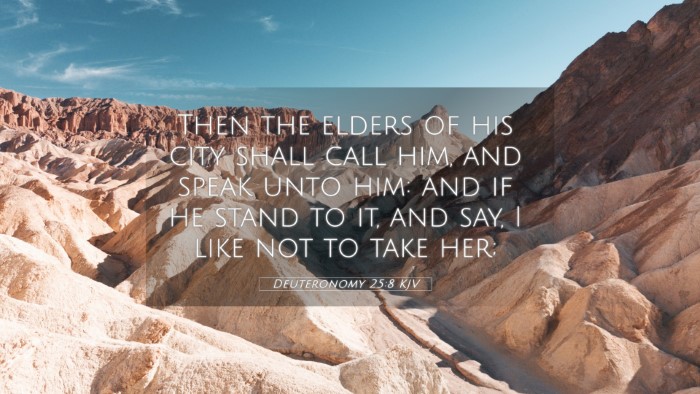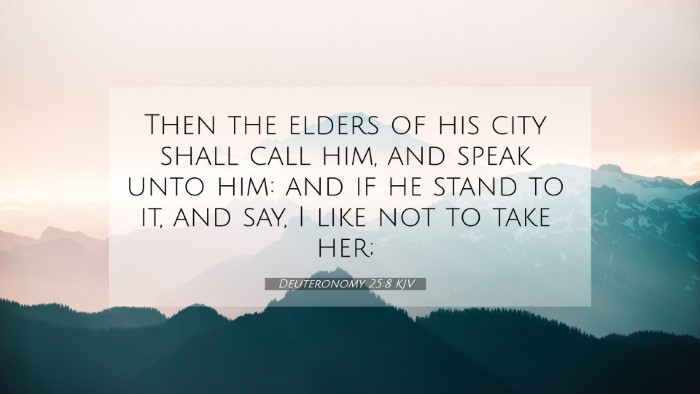Understanding Deuteronomy 25:8
Verse Reference: Deuteronomy 25:8
Bible Verse: "Then the elders of his city shall call him and speak to him. But if he stands firm and says, ‘I do not want to take her,’"
Summary of Meaning
This verse is situated in a broader context regarding the law of levirate marriage, which was instituted to protect the inheritance rights of the deceased and ensure family lineage. In this particular verse, it discusses the role of the city's elders in addressing the refusal of the prospective levir to marry his brother's widow.
Insights from Public Domain Commentaries
Matthew Henry:
Matthew Henry notes that the refusal of the man to fulfill his duty to marry the widow is significant in the context of Israel's social responsibilities. He emphasizes the importance of familial duty, particularly in maintaining the family name and properties. Henry suggests that the elders act as mediators, attempting to persuade the man of his responsibilities and the implications of his refusal, which would have societal and spiritual effects.
Albert Barnes:
Albert Barnes highlights that the legal context of this verse is crucial to understanding the societal structure of ancient Israel. He explains that the levirate law demonstrates God's providence in ensuring that family lines continue and heritage is preserved. Barnes elaborates on the societal pressures that may be exerted by the elders to compel the levir to act, reflecting the communal aspect of faith and obligation in Israelite culture.
Adam Clarke:
Adam Clarke provides insights into the implications of the refusal to marry. He stresses that the action or refusal not only affects the individuals but is also a communal issue, reflecting one's standing within the community. Clarke also explores the cultural practices of the time, elaborating on how the man’s stance represents a rejection of social norms that are pivotal for maintaining familial integrity.
Cross References
The following Bible verses provide added context and connections related to Deuteronomy 25:8:
- Genesis 38:8-10: The account of Onan and his refusal to fulfill his brotherly duty highlights the expectations of levirate marriage.
- Ruth 4:1-10: The story of Boaz and Ruth illustrates the practice of levirate marriage in action.
- Matthew 22:24-28: Jesus references levirate law while discussing resurrection, showing its theological importance.
- Mark 12:19-23: A parallel account where Jesus addresses the Sadducees and their question regarding marriage in the resurrection.
- 1 Timothy 5:8: Discusses familial responsibilities, echoing the themes of obligation found in Deuteronomy.
- Luke 20:28: Another account of the questioning around levirate marriage by the Sadducees, linking the Old Testament laws to New Testament discussions.
- Deuteronomy 25:7: The provision for the widow if the levir refuses her illustrates the laws of compassion and justice.
Thematic Connections
This verse and its surrounding narrative reveal essential themes regarding:
- Family Duty: Highlights the responsibilities individuals hold towards their family members.
- Community and Justice: Reflects on the role of the community in enforcing God's laws and societal norms.
- Covenantal Relationships: Illustrates the importance of keeping promises and obligations within the context of God's commandments.
Conclusion
Deuteronomy 25:8 emphasizes the significance of honoring family obligations while illustrating how the community plays an essential role in mediating and supporting these responsibilities. The legal frameworks provided in this passage not only guide individuals in maintaining family integrity but also underscore the communal aspects of God's covenantal relationships.
Tools for Bible Cross-Referencing
To dive deeper into the connections between Bible verses, one can utilize various tools:
- Bible Concordance: A reference tool that helps locate specific verses and their themes.
- Bible Cross-Reference Guide: Resources providing extensive cross-referenced Biblical texts.
- How to Use Bible Cross-References: Understanding the methodology of linking scriptures effectively.
- Bible Reference Resources: Comprehensive materials aiding in cross-referencing Bible studies.
Further Exploration
For those interested in a deeper comparative Bible verse analysis, consider exploring:
- Identifying Connections Between Old and New Testament: Analyze how laws, principles, and themes transcend both testaments.
- Detailed Cross-Reference Between Gospels: Examine similarities and variances in the accounts of Jesus and the Apostolic teachings.
- Bible Cross-References for Sermon Preparation: Use interconnected verses to craft meaningful and impactful sermons.
Further Questions
Some common inquiries related to this verse include:
- What verses are related to Deuteronomy 25:8?
- How do the teachings in Deuteronomy 25 connect to New Testament principles?
- Find cross-references for the theme of familial responsibilities in the Bible.



